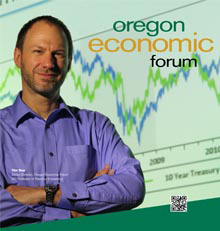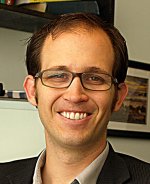11th annual event also will feature a national perspective on Wall Street's health and prospects for prosperity
PORTLAND — Sept. 29, 2014 — Will marijuana legalization, if approved by voters on Nov. 4, puff up the state's economy or produce a cloud of risky behavior and increased crime? That topic, a perspective on the health of Wall Street and how population shifts may affect Oregon will be among the subjects covered during the 11th annual Oregon Economic Forum, on Thursday, Oct. 16, in the Kridel Grand Ballroom of the Portland Art Museum, 1219 S.W. Park Ave.
The three-hour event begins at 7:30 a.m., with opening remarks by Chuck Lillis, chair of the UO Board of Trustees, and Dave Lofland, president of KeyBank in Oregon. Lofland attributes Key’s six years of sponsorship to the “extraordinary value that this annual review of the Oregon economy brings to our clients and our business.”
 Forum founder Tim Duy will present a status update on the state's economy. The University of Oregon economics professor says a solid recovery is underway in Oregon as the state enters its sixth year of growth since the end of the Great Recession. He also will look ahead with an economic forecast for 2015 and announce a new project he is launching to gain a more comprehensive picture of the Oregon economy.
Forum founder Tim Duy will present a status update on the state's economy. The University of Oregon economics professor says a solid recovery is underway in Oregon as the state enters its sixth year of growth since the end of the Great Recession. He also will look ahead with an economic forecast for 2015 and announce a new project he is launching to gain a more comprehensive picture of the Oregon economy.
A potential major player in next year's economic mix is whether the state will shift from its current position of allowing medical marijuana to full legalization. Colorado brought in $30 million in fiscal 2013-2014 and is expected to harvest $47.7 million in tax revenue in the current year, while Washington state economists foresee $25 million in tax revenue by July 2015 due to marijuana legalization.
 While projections for Oregon's coffers are in a holding pattern pending the election and potential taxing scenarios, UO economist Ben Hansen will address the potential health and welfare implications of full legalization. His research centers on adolescent and adult risk behavior in relation to medical marijuana laws, alcohol and traffic fatalities.
While projections for Oregon's coffers are in a holding pattern pending the election and potential taxing scenarios, UO economist Ben Hansen will address the potential health and welfare implications of full legalization. His research centers on adolescent and adult risk behavior in relation to medical marijuana laws, alcohol and traffic fatalities.
Also speaking will be Mark McMullen, state economist from the Oregon Office of Economic Analysis. He will address demographic changes in the state's population and how shifts in migration patterns may affect future economic growth.
Doug Elliott, a fellow of economic studies of the Washington, D.C.-based non-profit Brookings Institution, will delve into the current health of the nation's financial sector in the keynote address, "Making Wall Street Work for Main Street," beginning at 9:50 a.m. Elliott is the author of "Uncle Sam in Pinstripes: Evaluating the US Federal Credit Programs," a book that provides the only comprehensive review of the federal government's credit activities done in the past 25 years.
Pre-registration is required to attend the event. Doors open at 7 a.m. for breakfast.
The Portland Business Journal, Portland Business Alliance, Providence Health Plan, Langley Investment Properties and the Port of Portland also are sponsors of the Oregon Economic Forum.
Media Contact: Jen McCulley, Office of Public Affairs, 541-346-8880, jmccull@uoregon.edu
Source: Tim Duy, professor of practice, UO Department of Economics, 541-346-4660, duy@uoregon.edu
Note: The University of Oregon is equipped with an on-campus television studio with a point-of-origin Vyvx connection, which provides broadcast-quality video to networks worldwide via fiber optic network. In addition, there is video access to satellite uplink, and audio access to an ISDN codec for broadcast-quality radio interviews.